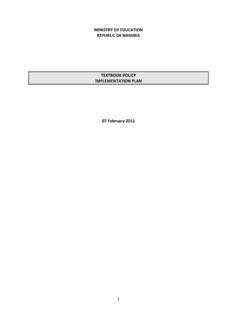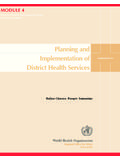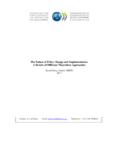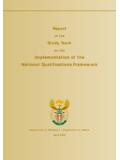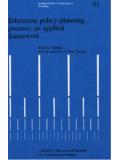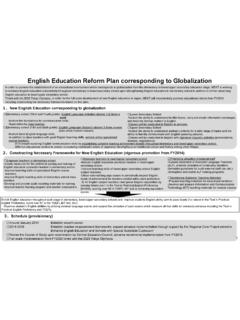Transcription of The Future of Education and Skills Education 2030 - oecd.org
1 The Future of Education and Skills Education 2030 What is OECD Education 2030? The aim of OECD's Education 2030: The Future of Education and Skills project is to support countries in finding answers to two far-reaching questions: What knowledge, Skills , attitudes and values will today's students need to thrive and shape their world in 2030? How can instructional systems develop such knowledge, Skills , attitudes and values effectively? The goal is to explore the bigger picture and longer-term challenges facing Education through the development of a conceptual Learning Framework for 2030; and make the process of curriculum design more evidence-based and systematic through an International Curriculum Analysis. OECD Education 2030 works with countries, thought leaders, experts, school networks, school leaders, teachers, students, and social partners, and aims to help stakeholders within the Education system to effectively implement curriculum reform.
2 The project allows stakeholders to exchange ideas, learn from and compare best practices and contribute to creating a new learning ecosystem. OECD Education 2030 focuses on secondary Education as a starting point, while recognising the importance of the learning progression across grade levels and life-long learning. Timeline and outcomes Co-create a conceptual Learning Framework for 2030 with all stakeholders Conduct an International Curriculum Analysis Build common ground on the principles and instructional designs that can effectively implement intended curricula Explore the types of competencies and profiles of teachers who can support all students to achieve desired outcomes for their Future success Strand 1: Learning Framework for 2030 OECD Education 2030 aims to build a common understanding of the knowledge, Skills , attitudes and values necessary to shape the Future towards 2030.
3 It defines: A clearer vision and goals for Education systems The framework challenges stakeholders to think ahead and foster innovative learning environments focused on inclusive growth of students that facilitate changes not only in Education systems but also the larger ecosystem. A common language for countries, local authorities, schools, teachers, students and other stakeholders A shared language can facilitate comparison across a wide range of instructional systems through which every stakeholder can communicate effectively, and learn about and compare best practices. The common vision and understanding of learning for 2030 draws on research that has been carefully reviewed, tested, and validated by various stakeholders for global relevance as well as policy and practical implications.
4 The Learning Framework for 2030 supports a global movement for accelerating Education towards a better Future through an iterative co-creation and co-development process involving multiple stakeholders. Children entering school in 2018 will be young adults in 2030. Schools are facing increasing demands to prepare students for rapid economic, environmental and social changes, for jobs that have not yet been created, for technologies that have not yet been invented, and to solve social problems that have not yet been anticipated. Education can equip learners with the agency, the competencies and the sense of purpose to shape their own lives and contribute to those of others. Therefore, change is imminent. OECD 2018 2 Strand 2: International Curriculum Analysis The project is conducting an international curriculum analysis to build a knowledge base that will allow countries to make curriculum design processes more systematic.
5 It supports international peer learning and evidence-based debates among the project s stakeholders. OECD Education 2030 has identified five common policy issues: Confronted with the needs and requests of parents, universities and employers, schools are facing curriculum overload. As a result, students often lack sufficient time to master key disciplinary concepts or nurture friendships, sleep and exercise. It is time to shift the focus from more hours for learning to quality learning time . Curriculum reforms suffer from time lags between recognition, decision-making, implementation and impact. The gap between curriculum intent and learning outcome is generally too wide. Content must be of a high quality if students are to engage in learning and acquire deeper understanding.
6 Curricula should ensure equity while innovating in order for all students to benefit from social, economic and technological changes. Careful planning and alignment is critically important for effective implementation of reforms. In response to these challenges, the Education 2030 project and its partners are identifying design principles that endure in different countries over time. The four branches within this strand are: Phase 2: 2019 and beyond In Phase 2, the project will aim to build common ground on the principles and instructional designs that can effectively implement intended curricula. This work will help countries to address common challenges of curriculum implementation and identify critical success factors. Reviewing mechanisms by which effective curriculum implementation can ensure success of all students can support countries to raise quality and equity in student learning, which in turn can lead to better social and economic outcomes for individuals and society at large.
7 The project will also explore the types of competencies and teacher profiles that can support all students achieve desired outcomes. Notions of expected teacher competencies and profiles can support countries in enhancing the quality of their teaching workforce, which is one of the key factors in effective curriculum implementation. These areas will be explored through a systematic analysis and consolidation of existing research, a country survey on curriculum implementation, and multi-stakeholder consultations, global peer-learning and triangulations. Policy Questionnaire on Curriculum Redesign (PQC) The PQC exercise gives countries the opportunity to learn from peers about good practices and challenges on curriculum redesign, policy initiatives and strategies.
8 It also maps trends across multiple country contexts. Curriculum Content Mapping (CCM) The CCM exercise aims to identify the extent to which competencies reflecting emerging demands ( global competencies, digital literacy, collaboration, critical thinking, creativity and empathy) are present in countries existing curriculum. This will allow policy makers to identify the learning area ( mathematics, natural sciences, arts, etc.) in which a given competency ( creativity) appears most prominently in written curricula. The results will provide important benchmarking and comparative data, which can help Future curriculum development. Stock-taking Exercise on Physical & Health Education It is the first time for the OECD to focus on physical and health Education as part of its policy analysis.
9 It will take stock of research evidence on the effects of physical Education / health Education . It will also aim to uncover new knowledge on the state of physical Education /health Education policies, curriculum, practices and perspectives in various countries. Mathematics Curriculum Document Analysis Project (MCDA) The MCDA project investigates the extent to which countries have incorporated broad perspectives on mathematical literacy and 21st century Skills in their current mathematics curriculum making use of a 21st Century Mathematics Framework developed for this project in conjunction with PISA 2021. Further information on the OECD Education 2030 project OECD Education 2030 welcomes interested countries and stakeholders to contribute to the project. Meetings are convened biannually.
10 The next meeting is in Paris, France, on 14 - 16 May 2018. To find out more about the project and to download the OECD Education 2030 Position Paper, please visit our website at.










